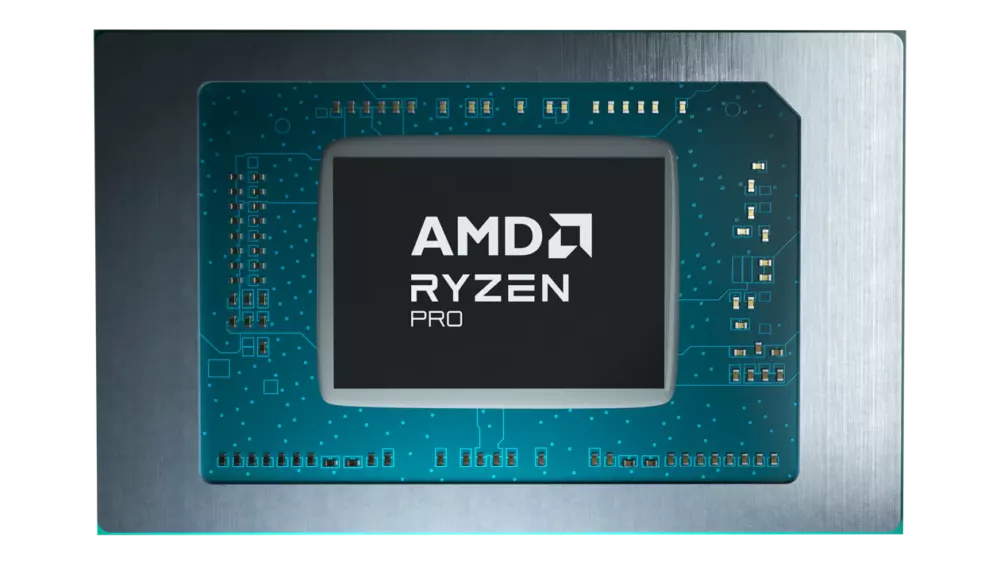
What is AMD Ryzen Pro?
AMD Ryzen Pro is the name of a family of desktop and laptop computer processors. Well, AMD calls them Ryzen PRO, but the capitalisation quickly becomes obnoxious.
Ryzen Pro chips use the same core architecture as regular Ryzen CPUs and can run all the same software, including Windows and Linux operating systems. However, Ryzen Pro models also offer business-friendly capabilities and design features that aren’t found in the company’s consumer chips.
Scroll down below to learn all about AMD Ryzen Pro or use the following links to jump to each section:
- Is AMD Ryzen Pro the same as Intel vPro?
- What does Ryzen Pro mean for performance?
- What does Ryzen Pro mean for security?
- What does Ryzen Pro mean for manageability?
- What’s the difference between a Ryzen 5 Pro and a Ryzen 7 Pro CPU?
- What’s the difference between Ryzen Pro and Ryzen Threadripper Pro?
- Is Ryzen Pro available for laptops?
- Does Ryzen Pro have any other advantages?
Is AMD Ryzen Pro the same as Intel vPro?
Ryzen Pro processors are aimed at the same markets as Intel vPro systems. However, Intel’s vPro platform requires that a computer’s CPU, BIOS and motherboard all meet specific criteria. By contrast, AMD’s Ryzen Pro branding only applies to the CPU. System builders and software partners are free to decide how (or whether) to implement the Ryzen Pro features in a particular PC.
What does Ryzen Pro mean for performance?
The Ryzen Pro branding doesn’t reflect a particular level of performance: it covers more than 30 chips across the Ryzen 5, Ryzen 7 and Ryzen 9 families. These processors range from quad-core models to 12-core monsters, designed to suit a wide range of roles and workloads, with different clock speeds, GPU provisions and power profiles.
For heavyweight workstations, there’s also a series of Ryzen Threadripper Pro chips with as many as 64 cores.
What does Ryzen Pro mean for security?

Ryzen Pro chips have all the same security and stability features as regular Ryzen CPUs, including support for UEFI Secure Boot and ECC memory. However, they also include a co-processor dedicated to security: the AMD Secure Processor (ASP).
AMD describes this as the “root of trust anchored in hardware”, as it validates code before it can be executed. So unauthorised software — such as malware — simply won’t run.
AMD additionally uses a technology called Shadow Stack, as shown in the image above. This detects hacking attempts by checking stored instructions and data against a “shadow” copy stored in hardware.
Then there’s AMD Memory Guard. With so much sensitive data stored in RAM, this is one way for hackers to bypass other security measures and even access encryption keys. Memory Guard encrypts login credentials, encryption keys and other text-based files stored in RAM.
A feature called Secure Encrypted Virtualisation encrypts virtual machines in a similar way, so their working data can’t be accessed by the host OS or hypervisor software. This provides an extra layer of privacy protection for virtual servers, and protects them if the host is infected by malware or compromised by a hacker.
What does Ryzen Pro mean for manageability?
Ryzen Pro CPUs are designed for remote management. Administrators can use the AMD Management Console to remotely boot, audit, configure and upgrade Ryzen Pro systems.
Unlike Intel’s AMT platform, Ryzen Pro is also compatible with the open DASH framework, meaning administrators can use other tools if they prefer, including the Microsoft Endpoint Manager console. System builders can alternatively integrate Ryzen Pro administration functions into their own management tools.
What’s the difference between a Ryzen 5 Pro and a Ryzen 7 Pro CPU?
AMD’s Ryzen Pro processors are enhanced versions of regular Ryzen chips. While they offer extra security and manageability features, their computing capabilities are the same as those of the corresponding non-Pro models. For example, the Ryzen 5 Pro 5645 has the same core specification as the Ryzen 5 5600, with six cores and a maximum Boost speed of 4.6GHz.
This means the difference between a Ryzen 5 Pro processor and a Ryzen 7 Pro processor is the same as the difference between non-Pro models.
Ryzen 5 Pro CPUs are designed for everyday desktop tasks, while Ryzen 7 Pro and Ryzen 9 Pro models deliver more power for intensive computations – but all of them offer AMD’s signature Ryzen Pro security and management technologies.
What’s the difference between Ryzen Pro and Ryzen Threadripper Pro?
Ryzen Threadripper Pro CPUs are Ryzen Pro chips with a very large number of internal cores, aimed particularly at high-end workstation tasks.
In the past, AMD offered both Threadripper and Threadripper Pro processors, just as with regular Ryzen chips. For example, system builders seeking a powerful CPU could choose between the Ryzen Threadripper 3990X and the equivalent Ryzen Threadripper Pro 3995WX.
Today, however, the latest Threadripper Pro 5000-series chips all come with Ryzen Pro features as standard.
The entry-level model is the Ryzen Threadripper Pro 5945WX, which has 12 physical cores and a top Boost speed of 4.5GHz.
The top-of-the-range chip is the AMD Ryzen Threadripper Pro 5995WX, with a massive 64 physical cores, capable of servicing 128 execution threads at once, while also fully supporting AMD’s advanced security and administration capabilities.
Is Ryzen Pro available for laptops?

AMD offers a range of mobile Ryzen Pro processors. The Ryzen 7 Pro 6850U is a popular model, offering eight CPU cores and a maximum Boost speed of 4.7GHz, packed into a low-power, laptop-friendly chip, with full support for Ryzen Pro technologies.
It’s the successor to the previous generation’s AMD Ryzen Pro 5850U, which offered similar computing and management capabilities but had a less advanced core design.
Does Ryzen Pro have any other advantages?
To help businesses establish and manage a stable platform, AMD guarantees that all Ryzen Pro processors will be available for 24 months from the date of release – which means multiple generations of the hardware are on sale at once.
AMD also promises no new mandatory software updates for the first 18 months, and backs up the hardware with a 36-month warranty – three times as long as it offers for consumer processors.
Summary
- Ryzen Pro processors have the same features as AMD’s regular Ryzen CPUs, plus custom capabilities aimed at businesses.
- Hardware security in Ryzen Pro chips prevents many types of malware and hacker attack.
- Ryzen Pro systems can be managed remotely, using Microsoft Endpoint Manager or other DASH-compatible tools.
- Unlike Intel’s vPro platform, the Ryzen Pro branding applies only to the CPU, and system builders are free to use the chips in any configuration.
This article was originally published on the 12th of February 2023. It was then updated on the 28th of August 2023 with three additional questions and minor updates to other entries.
Image copyright: AMD
NEXT UP

James McQuiggan, Security Awareness Advocate at KnowBe4: “Ironically, attack methods have remained unchanged over the past twenty years”
In this interview, we hear from James McQuiggan, Security Awareness Advocate at KnowBe4 and a part-time Faculty Professor at Valencia College in Florida.

What is ocean-bound plastic and should you care?
Lee Grant digs behind the truth about ocean-bound plastics to explain why reducing them is a worthy cause – but that we need to treat marketing claims with due scepticism

Slow buyers cause tech firms to rethink sales approaches as tough Q1 hits home
New research suggests tech sales were slow in Q1, with buyers of technology and professional services taking their time before committing to any solutions.